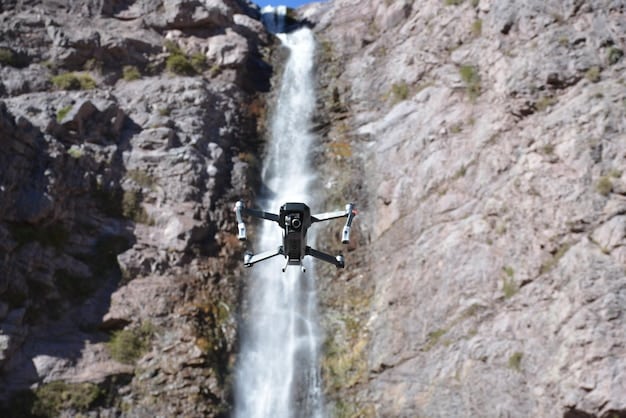AI in National Defense: How the US Military Uses Artificial Intelligence

The U.S. Military is utilizing Artificial Intelligence (AI) across various sectors, including enhancing cybersecurity, improving autonomous vehicles, and for better intelligence gathering to bolster national defense strategies and operational capabilities.
The integration of artificial intelligence in national defense is rapidly transforming the US military’s capabilities. From enhancing cybersecurity to improving autonomous systems, AI is playing a pivotal role in modern warfare and defense strategies. Let’s delve into the specifics of how the US military is harnessing AI to maintain its strategic edge.
How is the US Military Implementing Artificial Intelligence?
Artificial intelligence (AI) has moved from science fiction to strategic imperative within the U.S. military. The technology is being implemented across several fields to improve operational efficiency, enhance security, and maintain a competitive edge. From data analysis to autonomous systems, AI’s potential is vast.
The military is approaching AI implementation with a focus on integrating AI-powered tools to augment existing capabilities and exploring new technologies that could redefine combat. This involves significant investments in research and development and strategic partnerships with tech companies.
Cybersecurity Enhancement
One of the key areas where AI is making a substantial impact is in cybersecurity. AI systems can analyze massive amounts of data to detect and respond to cyber threats more effectively than traditional methods.
Autonomous Vehicles
AI is crucial in the development of autonomous vehicles for various purposes, including surveillance, transportation, and even combat. These vehicles can operate in complex environments without human intervention.

Here are some illustrative applications:
- Predictive Maintenance: AI algorithms analyze data from equipment sensors to predict when maintenance will be needed, reducing downtime and improving operational readiness.
- Threat Detection: AI systems can scan networks for anomalies that indicate cyberattacks, providing early warnings and automated responses.
- Logistics Optimization: AI optimizes supply chains, ensuring that resources are available when and where they are needed, reducing waste and improving efficiency.
In summary, the U.S. military is smartly using AI to boost defense, improve cybersecurity, and streamline logistics, making it a key element in their strategy for the future.
The Role of AI in Intelligence Gathering
Intelligence gathering has significantly evolved with the integration of AI. AI tools can process and analyze vast amounts of data at speeds unattainable by humans, drastically improving the quality and speed of intelligence.
AI’s ability to sift through large datasets to find patterns and anomalies is invaluable in detecting potential threats and assessing risks. This capability allows for more informed decision-making and strategic planning.
Enhanced Data Analysis
AI-driven analytics tools can process and interpret data from multiple sources, providing a more complete and accurate picture of potential threats. This includes information from satellites, drones, and ground sensors.
Predictive Analysis
AI can predict future events based on current trends and historical data. This capability is particularly useful for preventing terrorist attacks and anticipating geopolitical shifts.
Key benefits of using AI in intelligence:
- Real-time Analysis: Get immediate insights, enabling quicker responses to emerging threats.
- Improved Accuracy: Reduce false positives to focus on real threats effectively.
- Faster Processing: Handle large datasets quickly for timely intelligence.
The implementation of AI in intelligence gathering is a watershed development, providing unprecedented analytical capabilities that bolster national security and inform military strategy with precision.
AI-Powered Autonomous Systems on the Battlefield
Autonomous systems powered by AI are changing warfare. These systems range from drones and unmanned vehicles to robots designed to perform various tasks without direct human control. This shift promises to reduce risks to soldiers and increase operational effectiveness.
These autonomous systems can operate in environments too dangerous for humans, such as disaster zones or active combat areas. They can conduct surveillance, deliver supplies, and neutralize threats, often with minimal human oversight.

Drones and UAVs
AI-powered drones are used for surveillance, reconnaissance, and targeted strikes. They can fly for extended periods and navigate complex terrains, providing crucial intelligence and support to ground forces.
Unmanned Ground Vehicles (UGVs)
UGVs are designed to transport supplies, clear obstacles, and even engage in combat. They can operate autonomously or be remotely controlled by soldiers.
Important developments in AI-powered autonomous systems include:
- Enhanced Targeting: AI improves the precision of targeting systems, reducing collateral damage and increasing the effectiveness of strikes.
- Improved Navigation: AI enables autonomous vehicles to navigate complex environments without GPS, ensuring they can operate in contested areas.
- Better Coordination: AI facilitates better coordination between different autonomous systems and human soldiers, improving overall operational efficiency.
AI-driven autonomous systems improve military capabilities, offering faster, safer, and more efficient operations in dangerous zones, fundamentally altering how battles are fought and won.
Enhancing Military Training with AI
AI is revolutionizing how military personnel are trained. AI-powered training programs offer realistic simulations, personalized feedback, and adaptive learning, making training more efficient and effective. These programs can simulate a wide range of combat scenarios, allowing soldiers to practice decision-making under pressure without real-world risks.
AI analyzes trainee performance in real-time, providing personalized feedback and automatically adjusting the difficulty of the training. This adaptive approach ensures that each soldier receives the most appropriate and effective training.
Realistic Simulations
AI can create highly realistic simulations of combat environments, including terrain, weather conditions, and enemy tactics. These simulations provide soldiers with invaluable experience in a safe and controlled environment.
Personalized Feedback
AI systems can analyze trainee performance in real-time, providing immediate feedback on strengths and weaknesses. This feedback helps soldiers improve their skills more quickly and effectively.
Notable advantages of using AI in military training:
- Cost Reduction: Lower the costs by reducing the need for live exercises.
- Higher Readiness: Improve soldier preparedness by providing practical training.
- Adaptive Learning: Tailor training programs to meet individual needs.
AI is changing military training, providing advanced, personalized, and effective programs that ensure soldiers are ready for the challenges of modern warfare.
Challenges and Ethical Considerations of AI in Defense
The increasing reliance on AI in defense presents several challenges and ethical considerations. These include concerns about bias in algorithms, potential for autonomous weapons systems, and the risk of misuse. Addressing these concerns is essential to ensure that AI is used responsibly and ethically in the military.
One of the primary challenges is ensuring that AI algorithms are fair and unbiased. AI systems are trained on data, and if that data reflects existing biases, the AI system will perpetuate those biases. This can have serious consequences in military applications, such as targeting decisions.
Bias in Algorithms
AI algorithms can perpetuate existing biases if they are not carefully designed and tested. This can lead to unfair or discriminatory outcomes, particularly in areas such as targeting and surveillance.
Autonomous Weapons Systems
The development of autonomous weapons systems raises ethical concerns about accountability and the potential for unintended consequences. These systems could make life-or-death decisions without human intervention.
To navigate these complexities, it’s critical to adopt firm guidelines:
- Strict Oversight: Implement strict protocols and codes to prevent misuse.
- Ethical Design: Focus on creating AI systems that are morally sound and fair.
- Ongoing Evaluation: Continuously assess AI’s impact to catch and fix problems early.
Addressing the challenges and ethical considerations of AI in defense is vital to ensuring that this powerful technology is used in a way that protects and upholds human values.
Future Trends in AI for US National Defense
The future of AI in U.S. national defense is poised for continued innovation and expansion. As AI technology advances, we can expect to see even more sophisticated applications emerging. These include enhanced autonomous capabilities, improved cybersecurity defenses, and more personalized training programs. The integration of AI will be integral to maintaining a strategic advantage.
Future trends include the development of AI systems that can learn and adapt more effectively, as well as the integration of AI with other advanced technologies such as quantum computing and biotechnology. These advancements will further transform military operations.
Quantum Computing
Quantum computing could revolutionize AI by enabling the development of more powerful algorithms and the processing of larger datasets. This could lead to breakthroughs in areas such as cryptography and optimization.
Biotechnology
The integration of AI with biotechnology could lead to the development of new bio-sensors and medical treatments for soldiers. This could improve battlefield medical care and enhance soldier performance.
Expected future impacts of AI include:
- Strategic Planning: AI will enhance military strategizing due to predictive analysis.
- Rapid Adaptation: AI will quickly adapt to new threats, offering up-to-date solutions.
- Collaborative Tech: AI will encourage combining different advanced technologies.
Looking ahead, AI will play an increasingly critical role in U.S. national defense, providing new capabilities and transforming military operations across all domains.
| Key Point | Brief Description |
|---|---|
| 🛡️ Cybersecurity | AI enhances threat detection and automated responses in cyber defense. |
| 🚀 Autonomous Systems | AI-powered drones and vehicles perform surveillance and support missions. |
| 🎯 Intelligence Gathering | AI analyzes vast data to improve threat detection and predictive analysis. |
| 🧑🏫 Military Training | AI creates realistic simulations and personalized feedback for soldiers. |
Frequently Asked Questions
▼
AI enhances cybersecurity by quickly analyzing massive datasets to detect and respond to threats. This includes identifying anomalies and predicting potential cyberattacks, offering a stronger defense against digital threats.
▼
AI drives autonomous vehicles for surveillance, transportation, and even combat. These vehicles can operate without human intervention, navigating difficult terrains and performing tasks too risky for human soldiers.
▼
AI improves intelligence gathering by processing data from various sources, like satellites and drones, to identify patterns. This offers real-time analysis and predictive assessments for more informed strategic decisions.
▼
Ethical concerns around autonomous weapons include accountability and unintended consequences. These systems might make life-or-death decisions without human input, raising questions about moral responsibility and potential risks.
▼
AI improves training with realistic simulations, feedback, and adaptive learning programs. This allows soldiers to gain experience in simulated battlefields, enhancing their decision-making skills without real-world danger.
Conclusion
In summary, the U.S. military’s integration of AI signifies a dramatic shift towards enhanced capabilities and strategic advantages. While the ethical and practical challenges are considerable, the potential benefits of AI in national defense are undeniable, ensuring that the U.S. military remains at the forefront of global security.





